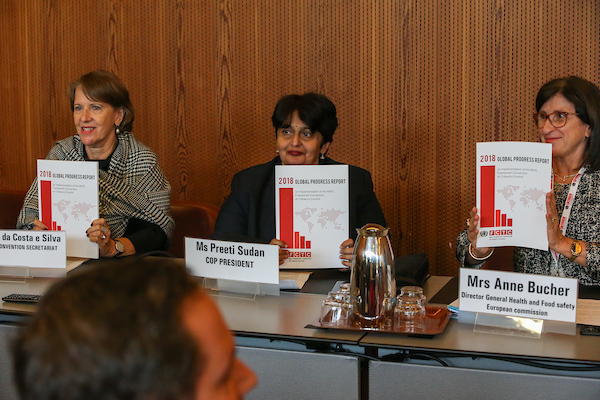
Delegates from around the world are gathered in Geneva to exchange their experience and agree the way forward for the implementation of the WHO Framework Convention on Tobacco Control (WHO FCTC). Based on strong evidence, the Convention sets minimum standard for its 181 Parties to help them adopting strong tobacco control policies and legislation to tackle the widespread pandemic, causing seven million deaths a year worldwide.
The Eight Session of the Conference of the Parties (COP8) to the WHO FCTC has started with the presentation of the results of the 2018 Global Progress Report, a publication based on official reports submitted by Parties to the Convention Secretariat. The Conference of the Parties is taking place until Saturday 6 October 2018.
Dr Vera Luiza da Costa e Silva said, “We are happy to report, based on the information received from the Parties in the 2018 reporting cycle, that progress is evident in implementation of most articles to the Convention, especially the time bound measures concerning smoke-free environments, packaging and labelling and tobacco advertising, promotion and sponsorship ban.”
While the status of implementation has consistently improved since the Convention’s entry into force in 2005, progress towards implementation of the various articles remains uneven, with rates ranging from 13% to 88%.
As was the case in previous reporting cycles, Article 8 (Protection from exposure to tobacco smoke), Article 11 (Packaging and labelling of tobacco products), Article 12 (Education, communication, training and public awareness) and Article 16 (Sales to and by minors) have been implemented most successfully. Meanwhile, Article 18 (Protection of the environment and the health of persons), Article 19 (Liability) and Article 17 (Provision of support of economically viable alternative activities) seem to be the least successfully implemented.
Important advances were observed in implementation of measures relating to the reduction of demand for tobacco. More than 90% of the Parties indicated having put in place tax and/or price policies, and the same percentage declared having banned smoking in all public places. A considerable number of Parties also shared their experience in extending or planning to extend smoking bans to outdoor environments, as well as on the inclusion of novel products in their existing smoke-free legislation.
Health warnings on tobacco packs are now required in almost 90% of Parties, with a growing number of Parties implementing or planning to implement plain or standardized packaging. Tobacco-dependence diagnosis and treatment services are included in national tobacco control programmes in more than two thirds of the Parties, which is significant progress compared to one half in 2016.
While most of the Parties have reported the existence of a comprehensive ban in their countries on all tobacco advertising, promotion and sponsorship, cross-border advertising remains less regulated and difficult to enforce. Over two thirds of the Parties have also reported enacting or strengthening legislation aimed at tackling illicit trade on the national level.
In 2018, an increasing number of Parties reported having put in place or developed comprehensive multisectoral national strategies and tobacco control action plans, with nearly two thirds reporting measures taken to prevent tobacco industry interference with tobacco control policies.
Even though 85% of the Parties have prohibited sales of tobacco products to minors and a growing number of the Parties have increased the minimum age to purchase tobacco products, there is still room for improvement, especially in banning self-service shelves and vending machines.
National tobacco surveillance systems established by more than 70% of the Parties, advances in research, and the observation of patterns of tobacco consumption have contributed to the improved monitoring of progress towards both the implementation of the WHO FCTC, which is a target in the Sustainable Development Goals, and global targets for noncommunicable diseases.
Dr da Costa e Silva said, “Reporting on the implementation of the WHO FCTC contributes to the dissemination of experiences and best practices, but it is also an opportunity for Parties to the WHO FCTC to share information on their challenges, needs and barriers.”
Tobacco industry interference, combined with the emergence of new and novel tobacco products, continues to be considered the most serious barrier to the implementation of the Convention. Despite the significant progress, the lack of human and financial resources remains the challenge cited most often by the Parties. Additionally, technical assistance is still very much needed in the fields of taxation, policy development, research and national cessation programmes.
Notes
The Convention is a milestone in the promotion of public health. It is an evidence-based treaty that reaffirms the right of people to the highest standard of health, provides legal dimensions for international health cooperation and sets high standards for compliance. The Conference of the Parties of the WHO FCTC is the governing body of the Convention.
The 2018 reporting cycle for the WHO Framework Convention on Tobacco Control (WHO FCTC) was conducted in accordance with decision FCTC/COP4(16), using an Internet-based reporting instrument. Data collection for the 2018 reporting cycle was carried out from 1 January to 31 March 2018. Of all 181 Parties to the Convention, 142 (78%) formally submitted their 2018 implementation reports, while most of the remaining Parties updated some of their information in the reporting database.